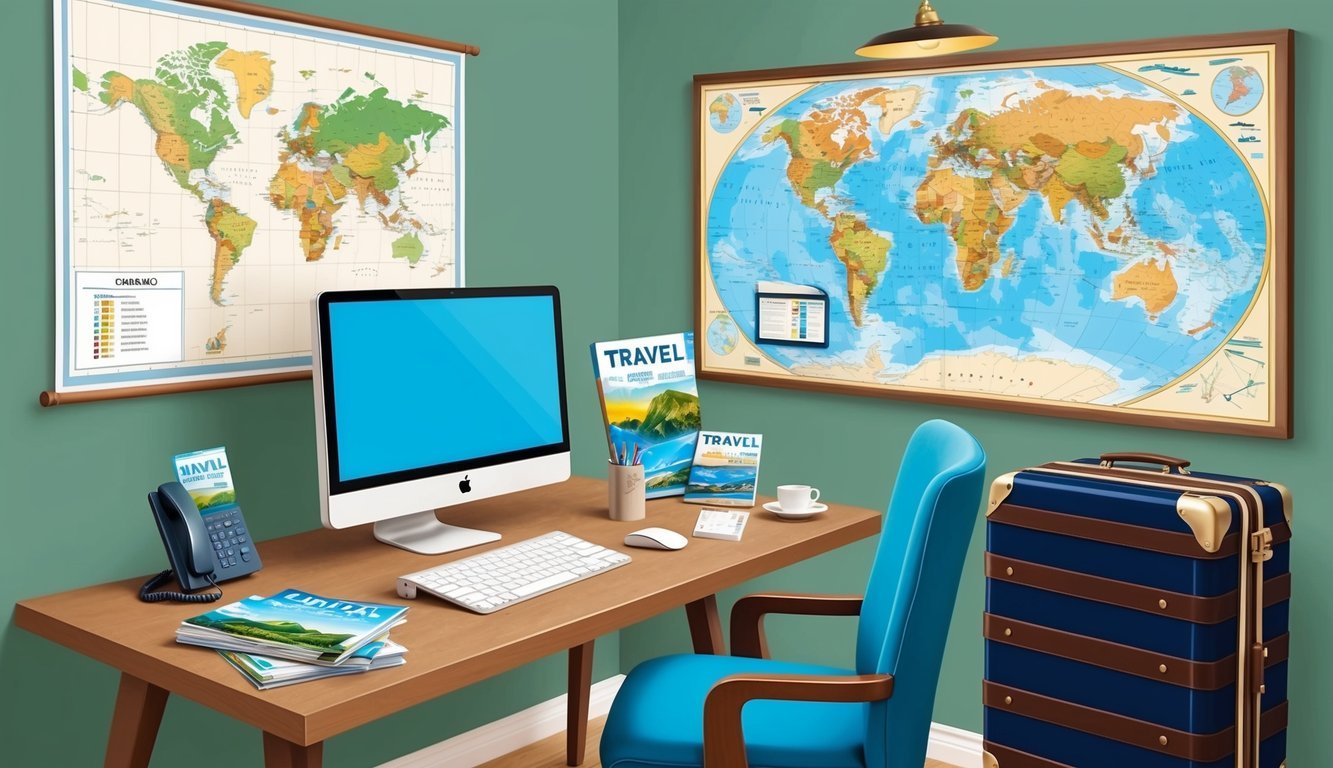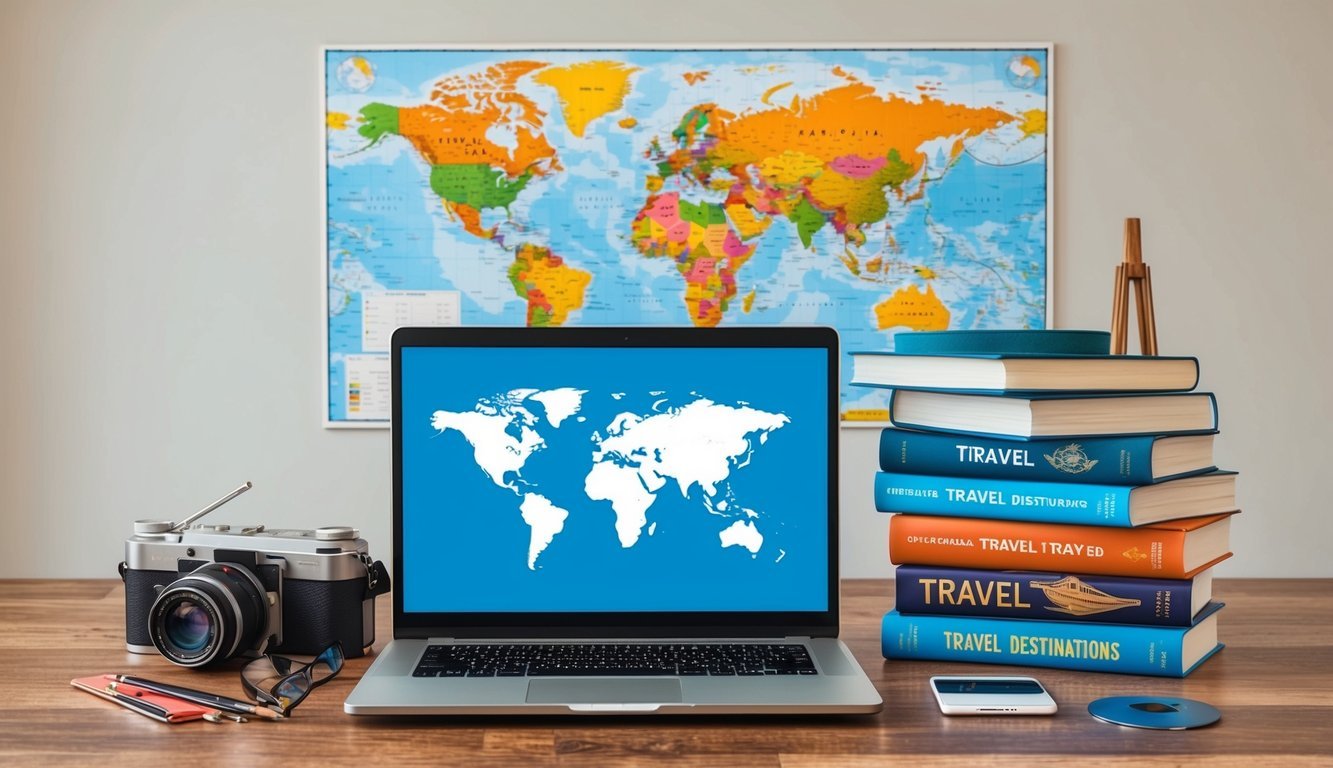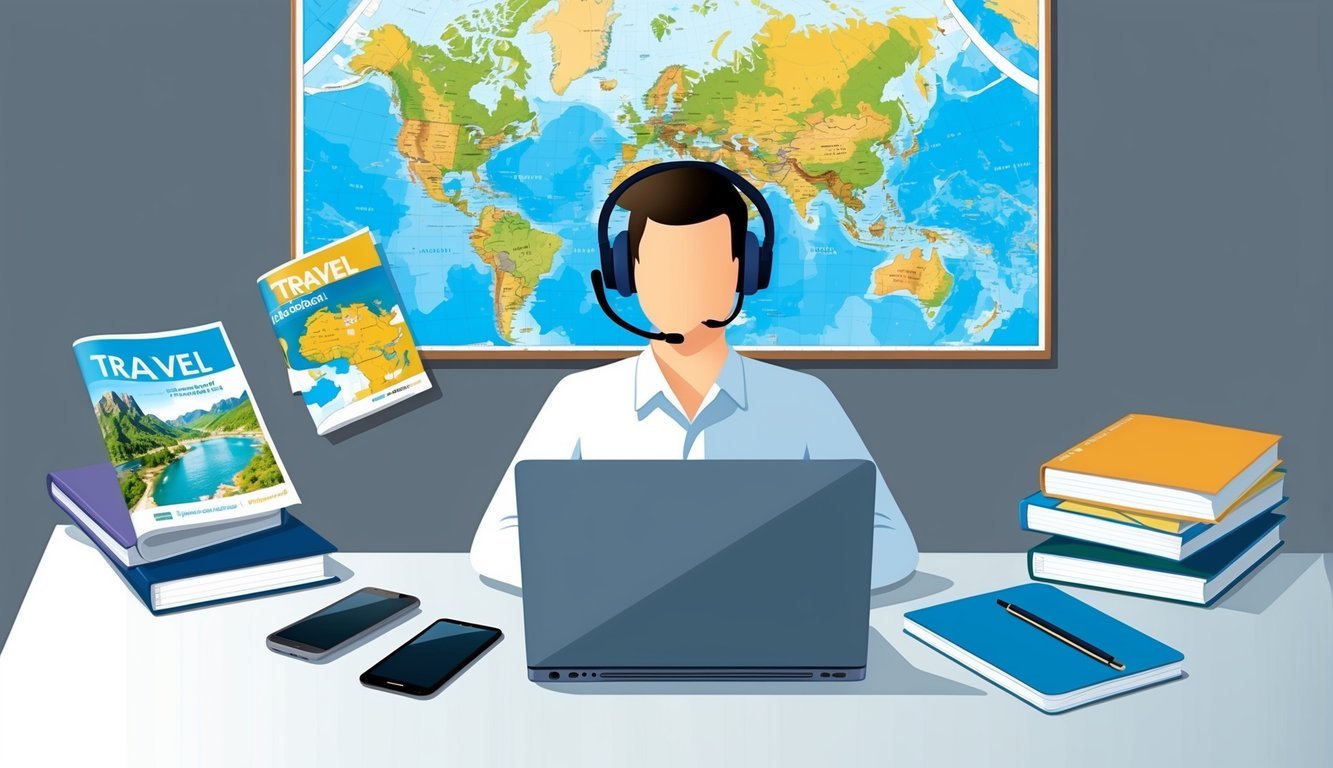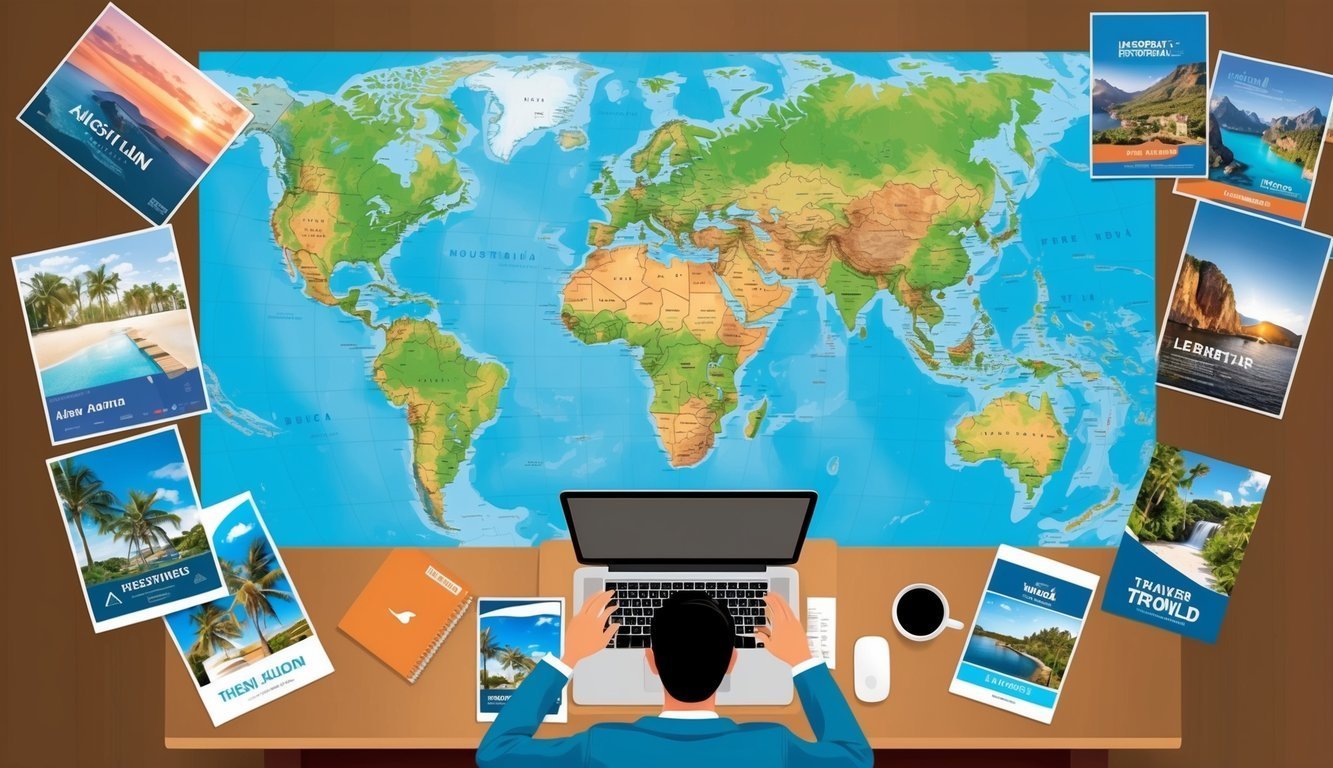Dreaming of a career that combines your passion for travel with the flexibility of remote work? A remote travel agent side hustle might be your perfect ticket to adventure.
This exciting opportunity allows you to plan dream vacations for others while working from the comfort of your own home.
As a remote travel agent, you can earn extra income by helping clients book flights, hotels, and experiences around the world. The best part? You don’t need extensive experience to get started.
Many companies offer training programs to help you learn the ropes and build your skills.
With the rise of digital nomads and flexible work arrangements, the demand for remote travel agents is growing.
Whether you’re looking to supplement your current income or transition into a full-time role, this side hustle offers plenty of potential for growth and personal fulfillment.
Key Takeaways
- You can start a remote travel agent side hustle with minimal experience and training
- Work from home while planning exciting vacations for clients
- Build a flexible career with potential for growth in the travel industry
The Basics of Being a Remote Travel Agent
Remote travel agents help clients plan trips from the comfort of their homes.
This flexible side hustle offers opportunities in the travel industry without the need for a physical office.
Defining a Remote Travel Agent
A remote travel agent is a professional who works from home to assist clients with their travel needs.
You’ll use online tools and resources to research, plan, and book trips for your customers.
Your responsibilities include finding the best deals on flights, accommodations, and activities.
You’ll also provide personalized recommendations based on your clients’ preferences and budget.
As a remote agent, you’ll need excellent communication skills to interact with clients via phone, email, and video calls.
Benefits of Choosing This Side Hustle
Working as a remote travel agent offers several advantages.
You’ll enjoy a flexible schedule, allowing you to balance your side hustle with other commitments.
This role also provides the opportunity to work in the exciting travel industry without leaving your home.
You can start small and grow your business at your own pace.
Many remote travel agents earn commission on bookings, which can lead to a steady income stream.
As you gain experience and build a client base, you may even turn this side hustle into a full-time career.
Another benefit is the chance to indirectly explore the world through your clients’ trips.
You’ll learn about different destinations and cultures, enhancing your own travel knowledge.
Setting Up Your Home Office

Creating a functional and comfortable workspace is crucial for your success as a remote travel agent.
The right setup will boost your productivity and help you maintain a professional image when interacting with clients.
Essential Equipment for a Home-Based Travel Agent
To kickstart your work-from-home travel agent career, you’ll need some key tools.
A reliable computer or laptop is your primary work device.
Invest in a high-speed internet connection to ensure smooth video calls and quick access to booking systems.
A comfortable, ergonomic chair and desk are must-haves for long hours of work.
Don’t forget a good headset with a microphone for clear communication with clients.
Consider a second monitor to enhance your multitasking abilities.
A printer/scanner combo can be useful for handling documents.
Lastly, get a surge protector to safeguard your equipment from power fluctuations.
Creating an Effective Work Environment
Your home office should be a dedicated space that promotes focus and productivity.
Choose a quiet area away from household distractions.
Good lighting is essential – natural light is best, but supplement with task lighting as needed.
Personalize your space with travel-themed decor to inspire you.
Keep your desk organized with storage solutions like file cabinets or shelving units.
Ensure your background looks professional for video calls.
A simple, clutter-free wall or a tasteful bookshelf works well.
Consider noise-cancelling headphones if you live in a busy household.
They can help you stay focused during important client calls or when you need to concentrate on complex itineraries.
Working With a Host Agency

Partnering with a host agency can be a game-changer for your remote travel agent side hustle.
It provides support, resources, and industry connections to help you succeed.
Choosing the Right Host Agency
When selecting a host agency, consider your specific needs and goals.
Look for agencies that offer comprehensive training programs and ongoing support.
Compare commission structures and fees to ensure they align with your financial objectives.
Check if the host agency provides access to booking platforms and marketing tools.
These resources can significantly boost your productivity and sales potential.
Read reviews from other travel agents and ask for references to gauge the agency’s reputation.
Consider the agency’s specialization.
Some focus on specific types of travel, like cruises or luxury vacations.
Choose one that matches your target market and personal interests.
How to Partner With Travel Suppliers
Building relationships with travel suppliers is crucial for your success.
Start by attending industry events and trade shows to network with representatives from airlines, hotels, and tour operators.
Join supplier webinars and training sessions to learn about their products and services.
This knowledge will help you sell more effectively and provide better recommendations to your clients.
Consider specializing in certain destinations or types of travel.
Suppliers often offer higher commissions and better perks to agents who consistently book their products.
Utilize your host agency’s existing relationships with suppliers.
They may have negotiated special rates or exclusive deals that you can leverage for your clients.
Remember to maintain professionalism in all your interactions with suppliers.
Prompt communication and accurate bookings will help you build a strong reputation in the industry.
Understanding Travel Planning
Travel planning requires attention to detail and knowledge of destinations, accommodations, and regulations.
It involves creating personalized itineraries and navigating complex travel rules.
Crafting Tailored Travel Itineraries
When crafting tailored travel itineraries, you’ll need to consider your clients’ preferences, budget, and timeline.
Start by asking about their interests, desired activities, and must-see attractions.
Research destinations thoroughly to recommend unique experiences.
Consider factors like:
• Transportation options
• Accommodations
• Local customs and culture
• Seasonal events and weather
Balance scheduled activities with free time to allow for spontaneity.
Be prepared to adjust plans based on client feedback and unforeseen circumstances.
Remember to include practical details like check-in times, reservation numbers, and contact information for each element of the itinerary.
Navigating Travel Regulations
Staying up-to-date with travel regulations is crucial for smooth trips.
You’ll need to research and understand:
• Visa requirements
• Passport validity rules
• Vaccination mandates
• Customs regulations
Keep track of ever-changing entry requirements, especially in light of global events.
Inform your clients about necessary documentation and help them obtain it if needed.
Be aware of travel advisories and restrictions for specific destinations.
Advise clients on travel insurance options to protect their investment.
Stay informed about airline policies, baggage allowances, and security procedures to ensure your clients are well-prepared for their journey.
Establishing a Professional Network
Building strong connections is crucial for success as a remote travel agent.
A robust network opens doors to valuable resources, insider knowledge, and potential clients.
Building Relationships With Clients
Start by creating a personalized approach for each client.
Learn their travel preferences, budget constraints, and bucket list destinations.
Keep detailed notes on their likes and dislikes.
Communicate regularly, even when they’re not planning a trip.
Share travel tips, destination highlights, or special deals tailored to their interests.
This keeps you top of mind when they’re ready to book.
Consider sending small gifts or personalized travel-related items on special occasions.
A thoughtful gesture can strengthen your bond and encourage repeat business.
Be responsive and available.
Quick replies to inquiries and proactive problem-solving during trips can turn clients into loyal advocates for your services.
Connecting With Other Travel Agents
Join professional organizations like the American Society of Travel Advisors.
These groups offer networking events, educational resources, and industry updates.
Participate in online forums and social media groups dedicated to travel agents.
Share your experiences and ask for advice.
This can lead to valuable mentorship opportunities.
Attend travel industry conferences and trade shows.
These events are perfect for meeting suppliers, learning about new destinations, and connecting with fellow agents.
Consider partnering with agents who specialize in different areas.
For example, if corporate travel is your focus, team up with an agent who excels in luxury vacations.
This way, you can refer clients to each other and expand your service offerings.
Finding Remote Travel Agent Jobs
Remote travel agent jobs offer flexibility and the chance to work from home while helping people plan their dream vacations.
You can start your career in this exciting field by knowing where to look and understanding what qualifications you’ll need.
Where to Look for Job Opportunities
You can find remote travel agent jobs on various platforms.
Check out job boards like Indeed, Glassdoor, and LinkedIn.
These sites often have listings from travel companies seeking home-based agents.
Travel industry leaders like World Travel Holdings frequently hire remote agents.
Keep an eye on their career pages for openings.
Consider joining online travel agent communities and forums.
Members often share job leads and insider tips on landing remote positions.
Don’t forget about freelance platforms. Fiverr can be a great place to start your travel agent side hustle, offering projects ranging from $5 to $18,000.
Understanding the Qualifications Required
To become a remote travel agent, you’ll need a mix of skills and qualifications.
Most companies require a high school diploma, but some prefer candidates with a degree in tourism or a related field.
Strong communication skills are essential.
You’ll be interacting with clients via phone, email, and chat, so you must be comfortable with various communication tools.
Knowledge of booking systems and travel industry software is crucial.
Many employers provide training, but familiarity with common platforms can give you an edge.
Customer service experience is highly valued.
Your ability to handle inquiries, resolve issues, and ensure client satisfaction is key to success in this role.
Some positions, like those with Booking Holdings, may require previous experience in the travel industry.
However, entry-level opportunities do exist for those just starting out.
Delivering Excellent Customer Experience

Exceptional customer service is crucial for success as a remote travel agent.
You’ll need to master communication skills and ensure top-notch travel services to keep clients happy and coming back.
Communicating Effectively With Clients
Clear and timely communication is key to your success.
Respond promptly to inquiries and use multiple communication channels like email, phone, and video calls.
Listen carefully to your clients’ needs and preferences.
Ask clarifying questions to fully understand their travel goals.
Be proactive in providing updates on bookings and itineraries.
Use simple language to explain complex travel arrangements.
Personalize your interactions to build rapport and trust.
Remember to follow up after trips to gather feedback and address any concerns.
Consider using a customer relationship management (CRM) tool to keep track of client details and preferences.
This will help you provide a more personalized experience for each traveler.
Ensuring High-Quality Travel Services
To deliver excellent customer experience, you must offer top-tier travel services.
Stay up-to-date with the latest travel trends, destinations, and industry news.
Develop strong relationships with travel suppliers to secure the best deals and perks for your clients.
Attention to detail is crucial.
Double-check all bookings, reservations, and travel documents for accuracy.
Anticipate potential issues and have contingency plans ready.
Offer personalized recommendations based on each client’s interests and budget.
Consider specializing in specific types of travel or destinations to become an expert in your niche.
This expertise will allow you to provide more valuable insights and recommendations to your clients.
Remember, your goal is to create unforgettable travel experiences that exceed expectations.
Marketing Your Travel Agent Services

Promoting your travel agent side hustle effectively can significantly boost your client base and income.
Focus on leveraging digital platforms and partnerships to reach potential customers.
Using Affiliate Marketing to Your Advantage
As a travel advisor, you can earn extra income through affiliate marketing.
Partner with hotels, airlines, and tour companies to promote their services.
When clients book through your unique affiliate links, you’ll receive a commission.
Start by researching affiliate programs in the travel industry.
Look for reputable companies offering competitive commission rates.
Create content that naturally incorporates these affiliate links, such as destination guides or travel tip articles.
Be transparent with your audience about using affiliate links.
This builds trust and maintains your credibility as a travel advisor.
Remember to disclose your affiliate relationships in your content to comply with regulations.
Social Media and Blogging as Promotional Tools
Instagram can be a game-changer for promoting your travel agent services.
Share stunning travel photos, insider tips, and client testimonials to showcase your expertise.
Use relevant hashtags to increase your visibility.
Start a travel blog to establish yourself as an authority in the field.
Write about your personal travel experiences, destination guides, and travel hacks.
This content helps attract potential clients and improves your search engine rankings.
Engage with your followers regularly.
Respond to comments and messages promptly.
Consider hosting live Q&A sessions or virtual travel workshops to connect with your audience directly.
Don’t forget other platforms like Pinterest and YouTube.
Create eye-catching travel boards or informative videos to reach different segments of your target market.
Balancing Your Side Hustle With Full-Time Commitments

Juggling a remote travel agent side hustle with your full-time job requires careful planning and smart time management.
You’ll need to make the most of your limited hours while deciding when it’s time to take the leap into full-time entrepreneurship.
Time Management for Part-Time Agents
Start by committing one hour a week to your travel agent side hustle.
This small commitment can help you build momentum without overwhelming your schedule.
Look for pockets of time in your day, like early mornings or lunch breaks, to focus on your business.
Use productivity tools to streamline your work:
- Calendar apps for scheduling client calls
- Task management software to track bookings
- Social media schedulers for marketing posts
Set clear boundaries between your day job and side hustle.
Avoid using company time or resources for your travel business to maintain professionalism and avoid conflicts of interest.
Consider batch working on weekends.
Dedicate a few hours to planning itineraries, researching destinations, and responding to client inquiries in one focused session.
When to Consider Turning Full-Time
Pay attention to your side hustle’s growth.
If you’re consistently booking clients and your income is approaching your full-time salary, it might be time to consider going all-in on your travel agent business.
Look for these signs:
- Your client base is growing steadily
- You’re turning down bookings due to time constraints
- Your passion for travel planning outweighs your interest in your day job
Before making the leap, ensure you have:
- A solid emergency fund (3-6 months of expenses)
- A business plan for scaling your operations
- Health insurance and retirement plans in place
Leverage your soft skills from your full-time job to boost your travel business.
Your professional experience can enhance your customer service, organization, and problem-solving abilities as a travel agent.
Growth and Scalability in the Travel Industry

The travel industry offers exciting opportunities for expansion and adaptation.
You can transform your side hustle into a thriving business by leveraging industry trends and exploring franchising options.
From Solo Agent to Travel Agency Franchise
Starting as a solo travel advisor allows you to build a strong foundation.
As your client base grows, you might consider scaling up to a travel agency franchise.
This transition requires careful planning and financial preparation.
To make the leap:
• Evaluate your business viability
• Build a financial cushion
• Research franchise opportunities
Franchising can provide brand recognition and support systems, helping you expand more rapidly.
You’ll gain access to established marketing strategies and booking systems, allowing you to focus on client relationships and trip planning.
Keeping Up With Travel Trends
Staying current with travel trends is crucial for your growth as a remote travel agent.
The industry evolves quickly, and your clients will look to you for the latest insights.
Key areas to focus on:
• Sustainable travel options
• Luxury experiences
• Off-the-beaten-path destinations
• Wellness and adventure tourism
Engage with social media and industry publications to stay informed.
Consider specializing in trending niches like luxury travel to set yourself apart.
Attending travel conferences and networking events can also help you stay ahead of the curve.
Frequently Asked Questions

Remote travel agent side hustles offer flexibility and income potential, but require skills and effort to succeed.
Let’s explore some common questions about this unique opportunity.
What’s it like working as a remote travel agent on the side?
As a remote travel agent, you’ll enjoy the freedom to work from anywhere with an internet connection.
You’ll spend your time researching destinations, booking trips, and assisting clients with their travel needs.
It can be exciting to help people plan their dream vacations.
But remember, you’ll need to juggle this side gig with your main job and personal life.
How much dough can you rake in as a part-time online travel agent?
Your earnings as a part-time travel agent can vary widely.
Some remote travel agents make around $22 per hour.
Your income potential increases as you gain experience and take on more responsibilities.
Those who handle both sales and managerial duties can earn up to 81% more than agents focused solely on frontline sales.
Are there legit remote travel agent gigs out there?
Yes, there are legitimate remote travel agent opportunities available.
Companies like World Travel Holdings and Travel Leaders Group offer remote positions for travel agents.
Booking Holdings is another reputable company that hires home-based travel agents.
These firms often provide training and support to help you succeed in your role.
What do I need to learn to start moonlighting as a travel agent?
To become a successful remote travel agent, you’ll need to develop strong customer service skills and gain knowledge about various destinations and travel products.
Familiarize yourself with booking systems and travel industry trends.
Some companies may require previous experience or offer training programs to get you started.
What are folks saying about their side gig as a remote travel agent?
Many remote travel agents enjoy the flexibility and opportunity to turn their passion for travel into income.
They appreciate being able to work from home and set their own schedules.
Some find it challenging to balance client demands with their primary job.
Others mention the satisfaction of helping people create memorable travel experiences.
How do remote travel agents find their clients?
Successful remote travel agents often use various marketing strategies to attract clients.
This can include building a strong social media presence and running email campaigns.
Many also tap into their existing professional and social networks, reaching out to friends, family, and colleagues.
Some host agencies provide support in finding and managing clients as well.


